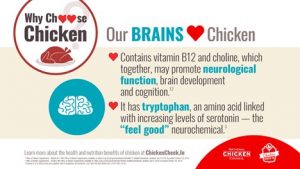What comes to mind when you think about the nutritional benefits of chicken? Protein? Maybe that it’s low in calories? Well, there’s a lot more to uncover about why choosing chicken is a healthy decision. This week on the Chicken Check In blog, we highlighted five nutritional benefits about chicken you may be surprised to learn.
1. Choline
Lean proteins like chicken are important first foods for infants and toddlers (0-2 years old) as sources of iron, zinc, protein, choline, and long chain polyunsaturated fatty acids. Choline is a nutrient that pregnant or lactating women don’t get enough of, but is critical for a child’s normal brain development – and chicken has it! In fact, choline plays a role in good health throughout the lifespan. Young children need choline for continued brain development and recent research is even shedding light on the role of choline for impacting mood and preserving cognitive function into adulthood.
A 3.5 ounce boneless, skinless chicken breast that is roasted contains about 31 grams of protein. However, what makes the protein from chicken stand out compared to many plant-based proteins, is that it’s higher-quality, meaning it has enough of each of the nine essential amino acids – the building blocks of protein – that are needed in the human diet. You can only get the nine essential amino acids from the foods you eat, and many plant-derived foods have a less favorable amino acid profile, which means they can be difficult to digest and not as usable in the body.
3. Don’t Forget the Nutrients in Dark Meat Cuts of Chicken
Dark meat is slightly higher in calories and fat, and typically contains more vitamins (e.g., riboflavin, thiamin, and vitamins B6 and B12) and minerals (e.g., iron and zinc) than white meat cuts. Dark meat also contains more flavor and is less likely to dry out or become overly chewy during the cooking process due to its juicy, tender texture. You can find a side-by-side nutritional comparison of dark versus white meat chicken by cut, here. Both dark and white meat chicken are nutritious and can fit into a healthy eating pattern.
4. Unsaturated Fats
Lifestyle changes for better heart health includes replacing certain types of fats (like saturated fats or trans fats) with sources of healthier fats (like unsaturated fats). In general, red meat has more saturated (bad) fat than chicken, and chicken does provide unsaturated fat. Chicken is also America’s favorite low-fat, low-sodium and low cholesterol high-quality protein source that fits into the top two heart-healthy diets and many studies suggest that including lean chicken as part of your eating pattern is linked with less risk of heart disease.
Vitamin B12 is a nutrient that helps keep the body’s nerve and blood cells healthy and helps make the DNA in your body! Dark and white meat chicken contains vitamin B12, which may promote brain development in children, help the nervous system function properly and aid cognitive performance in older adults. 3.5 ounces of skinless dark meat chicken thigh is a good source of your recommended daily value for vitamin B12 (0.42 micrograms).
So, there you have it! 5 nutritional benefits you didn’t realize about chicken! Looking for recipe inspiration to put your newfound knowledge to the test in tasty, creative and easy ways? Check out these recipes on Chicken Roost.



